West African giant Nigeria is known for its diverse and colorful culture, with over 250 ethnic groups and tribes. Each Nigerian tribe has its unique set of beliefs, customs, and traditions that have been passed down for generations. From buzzing festivals to rich folklore, Nigerian tribes are a testament to the beauty and diversity of African culture.
In this article, we will take a closer look at the different tribes of Nigeria, exploring their unique cultures and traditions that make them stand out in the world.
So, buckle up and get ready to embark on a fascinating journey through the rich and diverse tapestry of Nigerian tribes.
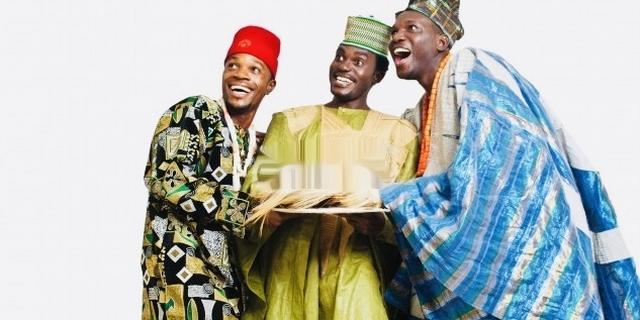
Nigerian Tribal Groupings
Nigeria is home to over 250 ethnic groups and tribes, each with its unique set of customs, beliefs, and traditions. These tribes can be grouped into three main tribal groupings based on their geographic locations and linguistic affiliations.
Understanding these tribal groupings is essential because it helps us appreciate the diversity and richness of Nigerian cultures and traditions. Here, we will explore each of these tribal groupings in detail.
The three main Nigerian tribes are:
- The Hausa-Fulani
- Yoruba
- Igbo
Each of these groups has its distinctive cultural practices, beliefs, and traditions that have been passed down from generation to generation.
The Hausa-Fulani
The Hausa-Fulani tribe is the largest ethnic group in Nigeria, primarily located in the northern part of the country. They are predominantly Muslims and have a rich history dating back to the 11th century.
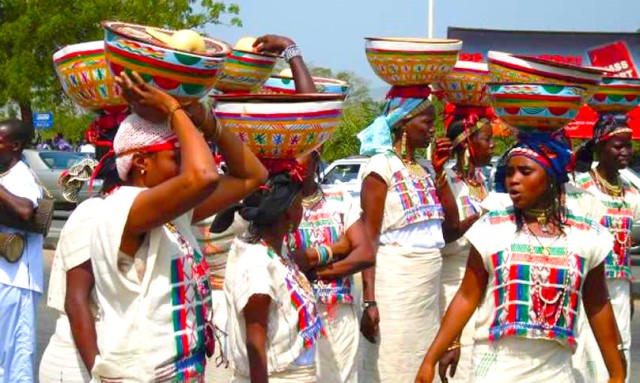
The Hausa-Fulani are known for their hospitality, love for commerce, and skill in crafts such as leatherwork, weaving, and metalwork.
Read: Unpacking the Culture of the Hausa Tribe in Nigeria
Additionally, their cultural practices and beliefs are rooted in Islam. This influences their daily lives, including their traditional clothing, food, and religious practices.
Some significant Hausa-Fulani festivals include the Eid-el-Fitr, and Eid-el-Kabir. The annual Durbar Festival is another colorful display of horsemanship and culture.
The Yoruba
The Yoruba tribe is the second-largest ethnic group in Nigeria and is primarily located in the southwestern part of the country. As a result, Yorubas have a rich history dating back to the 12th century.
In addition, their cultural practices and beliefs are heavily influenced by their religion, Yoruba mythology, and folklore.
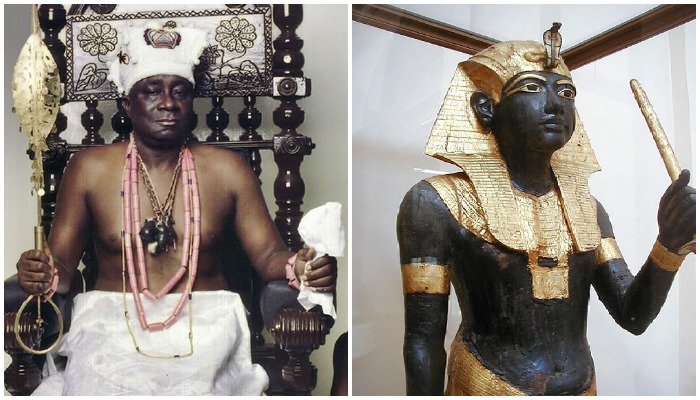
Read: What are Yoruba people known for?
We Design & Develop Websites, Android & iOS Apps
Looking to transform your digital presence? We specialize in creating stunning websites and powerful mobile apps for Android and iOS. Let us bring your vision to life with innovative, tailored solutions!
Get Started TodayThe Yoruba tribe is famous for its bright festivals and ceremonies, such as the annual Ojude Oba Festival, Egungun Festival, and the Osun Osogbo Festival.
Their traditional attires are vibrant, consisting of brightly colored fabrics, beads, and accessories. The Yoruba people are also renowned for their art, music, and dance, which are often used to express their beliefs and cultural heritage.
The Igbo
Igbos are the third-largest ethnic group in Nigeria. The tribe is primarily located in the southeastern part of the country. The Igbo people have a rich cultural heritage dating back to pre-colonial times.
Their cultural practices and beliefs are deeply rooted in their religion, which is a mix of Christianity, traditional beliefs, and customs.
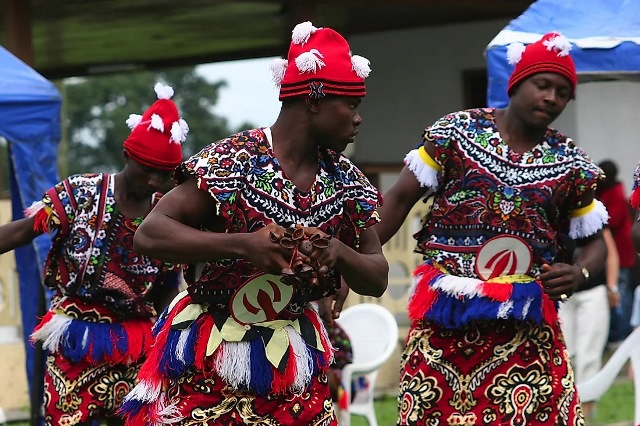
Read: What are Igbo people known for?
The Igbo people are renowned for their traditional dance and music, such as the Ekwe, Ogene, and Igba.
They also have a rich culinary tradition, with their delicacies such as Ofe Oha (Oha Soup), Nkwobi, and Abacha, which are enjoyed both within and outside the country. Some of the significant Igbo festivals include the New Yam Festival (Iwa Ji), Mmanwu Festival, and the Ofala Festival.
Cultural Practices and Beliefs of Nigerian Tribes – Yoruba
The Yoruba religion is a mixture of Christianity, Islam, and traditional beliefs. They believe in the existence of a supreme being, Olodumare, who created the universe and everything in it. The Yoruba people also believe in lesser gods and goddesses, believed to control various aspects of life, such as fertility, childbirth, and the harvest.
Moreover, Yorubas are known for their respect for elders, family values, and hospitality. They also place a high value on education, and many Yoruba people are highly educated and successful in various fields.
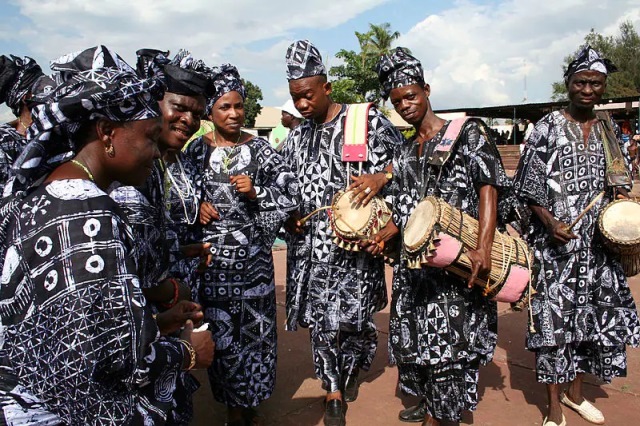
Festivals and Ceremonies
Like other Nigerian tribes, the Yorubas are also famous for their festivals and ceremonies, which are a significant part of their cultural heritage. Some of the major Yoruba festivals and ceremonies include:
- Ojude Oba Festival: This is an annual festival held in Ijebu Ode, Ogun State, to celebrate the arrival of the king and his entourage.
- Egungun Festival: This masquerade festival is held annually to honor ancestors and departed loved ones.
- Osun Osogbo Festival: Besides the popular Egungun festival, Yorubas also celebrate the Osun Osogob Festival. This annual festival is held in honor of the Osun River goddess, Osun, in Osogbo, Osun State.
Traditional Attires and Fashion
The Yoruba people are renowned for their vibrant traditional attires, which are often made of brightly colored fabrics, beads, and accessories.
Yoruba men wear a traditional attire called Agbada, which is a flowing robe worn over a shirt and trousers. Women’s traditional attire is called Buba and Wrapper, which is a blouse and wrapper worn over a skirt or trousers. There’s also the aso-oke, which translates to “top cloth” in English, denoting a fabric of high status.
Additionally, Yorubas have intricate tribal marks used for identification.
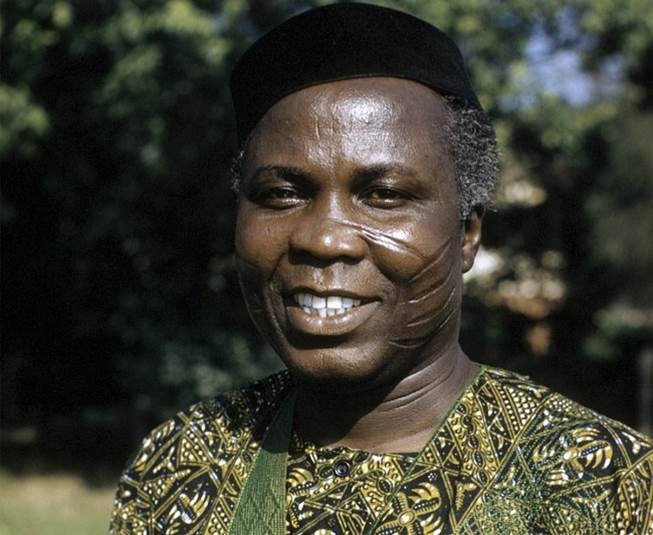
The Yoruba people are also known for their love of fashion and are often seen wearing trendy and stylish clothes. Moreover, Yoruba fashion designers have made a significant impact in the Nigerian fashion industry and beyond, with their unique designs and use of traditional fabrics.
We Design & Develop Websites, Android & iOS Apps
Looking to transform your digital presence? We specialize in creating stunning websites and powerful mobile apps for Android and iOS. Let us bring your vision to life with innovative, tailored solutions!
Get Started TodayYoruba Art
The Yoruba people are renowned for their art, which is often used to express their beliefs and cultural heritage. Yoruba art includes sculptures, carvings, paintings, and textiles, which are highly prized and sought after by collectors and art enthusiasts.
The Yoruba people are also famous for their traditional dance and music, such as the Bata dance, Agidigbo, and Sakara music.
Cultural Practices and Beliefs of Nigerian Tribes – Hausa-Fulani Tribe
The Hausa-Fulani people are predominantly Muslim, and their faith influences every aspect of life. In addition, they place a high value on education, respect for elders, family values, hospitality, and social relationships. They are often described as warm and welcoming people who prioritize strong interpersonal connections.
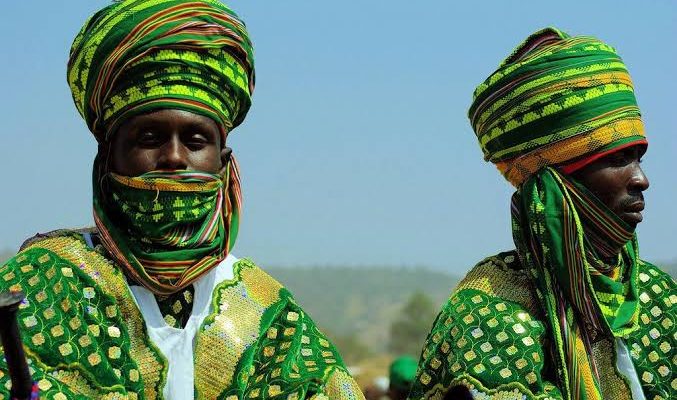
Festivals and Ceremonies
The Hausa-Fulani people are famous for their festivals and ceremonies, which are a significant part of their cultural heritage. Some of the major Hausa-Fulani festivals and ceremonies include:
- Durbar Festival: This is an annual festival held in several cities in northern Nigeria, including Kano, Zaria, and Sokoto.
- Sharo Festival: Besides Durbar, the Sharo Festival is a Fulani festival held to mark the end of the Ramadan fasting period. The festival is a display of bravery, as young men engage in a public flogging contest to prove their courage and manhood.
- Hawan Daushe: This is another Hausa festival held to celebrate the end of the Muslim holy month of Ramadan.
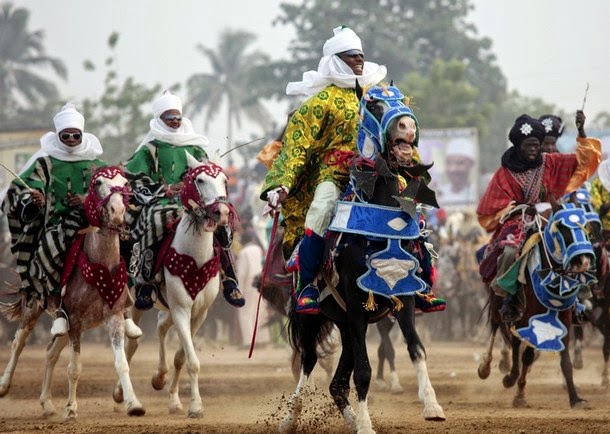
Traditional Attires and Fashion
The Hausa-Fulani people are known for their vibrant traditional attires. Men wear Babban Riga, a long flowing gown over trousers, while women’s attire consists of a skirt and blouse with a headscarf.
They also love jewelry such as necklaces, bracelets and earrings; they have elaborate hairstyles adorned with beads and cowrie shells.
Art
The Hausa-Fulani people are renowned for their art, which is often used to express their beliefs and cultural heritage. Hausa-Fulani art includes sculptures, carvings, paintings, and textiles. They are also famous for traditional dance and music such as Ganga music, Dan Gwari, and Waka Music which entertain while educating on culture & beliefs.
Cultural Practices and Beliefs of Nigerian Tribes – Igbo
The Igbo people have a rich cultural heritage with diverse religious beliefs. They are known for their strong work ethic, and many engage in agriculture, trade, and entrepreneurship. The Igbo people also highly value education. They place a high premium on social relationships within family and community.
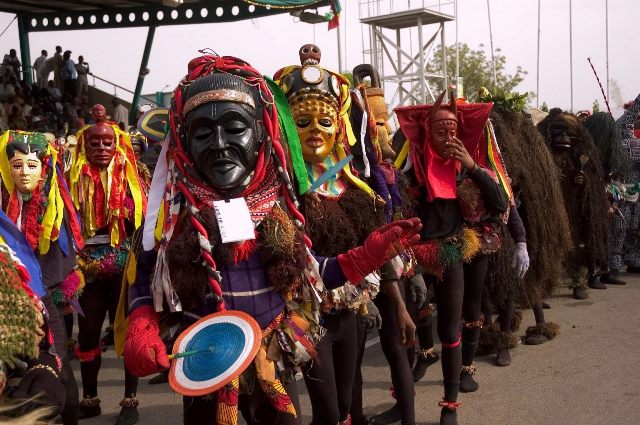
Festivals and Ceremonies
The Igbo people are also famous for their festivals and ceremonies, which are a significant part of their cultural heritage. Some of the major Igbo festivals and ceremonies include:
We Design & Develop Websites, Android & iOS Apps
Looking to transform your digital presence? We specialize in creating stunning websites and powerful mobile apps for Android and iOS. Let us bring your vision to life with innovative, tailored solutions!
Get Started Today- New Yam Festival: This is an annual festival held to celebrate the harvest of yams, which is a staple food in Igbo culture.
- Mmanwu Festival: This is a traditional masquerade festival held to honor the ancestors and spirits.
- Iri Ji Festival: In addition to the New Yam festival, Iri Ji is held to celebrate the first yam harvest of the year.
Traditional Attires and Fashion
The Igbo people are renowned for their vibrant traditional attires. These are often made of brightly colored fabrics, beads, and accessories.
Igbo men wear a traditional attire called Isiagu. This is a patterned shirt worn over trousers. Igbo women are certainly not left out. Women’s traditional is called George Wrapper. The long flowing skirt worn with a blouse and a headscarf is also as vibrant as the men’s clothing.
Indeed, the Igbo people are known for their love of jewelry, and they often wear elaborate coral and beaded necklaces, bracelets, and earrings. They are also known for their elaborate hairstyles, which are often adorned with beads and cowrie shells.
Art
Igbo art is often used to express their beliefs and cultural heritage. As a result, many Igbo communities appreciate indigenous art. It includes sculptures, carvings, paintings, and textiles, which are highly prized and sought after by collectors and art enthusiasts.
The Igbo people are also famous for their traditional music, such as Highlife music, which is a blend of traditional Igbo music and Western instruments. Moreover, this music is used to entertain and educate people on Igbo culture and beliefs. So, it adds to their allure and acceptance.
In summary, Nigerian tribes are a credit to West Africa and the continent as a whole. These are only the three major Nigerian tribes with incredible diversity. However, there are still many more tribes, each unique in its own way.
The Ijaw, Kanuri, Ibibio, and Tiv are the other ethnic groups in the country. Nigeria is also home to 500 disticnt languages, making it one of the most culturally-diverse nations on the planet.
Before you go…
Hey, thank you for reading this blog to the end. I hope it was helpful. Let me tell you a little bit about Nicholas Idoko Technologies. We help businesses and companies build an online presence by developing web, mobile, desktop, and blockchain applications.
We also help aspiring software developers and programmers learn the skills they need to have a successful career. Take your first step to becoming a programming boss by joining our Learn To Code academy today!
Put Your Tech Company on the Map!
Get featured on Nicholas Idoko’s Blog for just $200. Showcase your business, boost credibility, and reach a growing audience eager for tech solutions.
Publish Now










